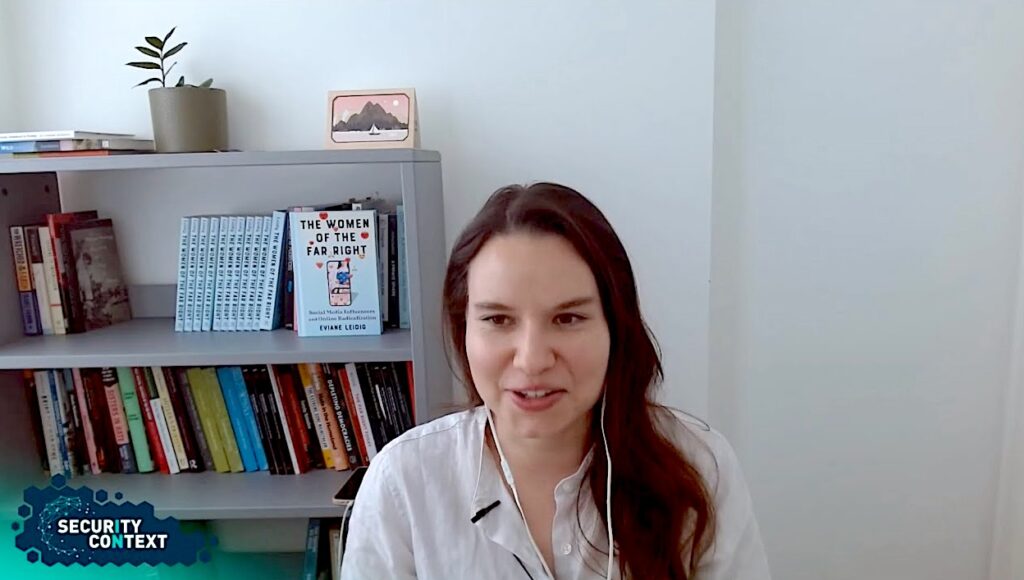EU-backed feminist ‘expert’ on traditional women says they should be censored but hasn’t interviewed a single one
A feminist researcher investigating how online media platforms control “extremist” content is calling for “more repressive measures” against traditional women who provide both political…

A feminist researcher investigating how online media platforms control “extremist” content is calling for “more repressive measures” against traditional women who provide both political commentary and images of their family life on these platforms.
Eviane Leidig touts the European Union (EU) is funding her postdoctoral fellowship project at Tilburg University. Meanwhile, she is promoting her book The Women of the Far Right: Social Media Influencers and Online Radicalization, which, she says, represents “three years of investigating women social media influencers who recruit, radicalize, and spread propaganda for the far right.”
Leidig is targeting how online platforms regulate content by women “influencers” of traditional values – called “tradwives” – particularly those who use platforms, such as YouTube, to present their political views, and then post images of their family life on other social media platforms.
In a November interview with Diggit Magazine, Leidig explained she felt an “update” on “far-right” women was in order, primarily because of her perception that traditional women are attempting to “normalize and legitimize far-right ideology and ideas for mainstream audiences.”
“[T]his is what separates them from a lot of their male counterparts,” she reasoned. “So, while these far-right women were also, say, providing political commentary on YouTube, or offering hot takes on current events, just like their male counterparts, what drove my interest in these women was how they would present themselves on other platforms – like Instagram, for example, in order to paint this more holistic picture of themselves.”
Leidig seems troubled by women with traditional values who provide both political commentary on YouTube, and then shift gears to discuss what they are “cooking that night” for dinner, and how they are engaged in activities such as “gardening with their children.”
The activist academic views this presentation of both a politically coherent woman who is also devoted to her husband and children as a plot to instill traditional values in society:
This type of more holistic image that I argue is part, part of their metapolitical strategy – and by that I mean they are trying to push for a long-term societal change when it comes to cultural and social values. And they try to model that lifestyle for their audiences. And I think that is what separates them from say their male counterparts because they are trying to model this lifestyle in which they merge both their political ideology along with their personal lifestyle and branding.
In another example of what she calls this “radicalization” process, the EU-supported researcher accused some of these traditional women of posting a video of “say, their honeymoon,” in which they “will share with their audiences their experiences” of a more personal part of their lives.
“And then often times they will take what is a personal decision, that is getting married and going on a honeymoon, and weaponize that actually into a political act, and they will say that society is anti-marriage, anti-traditional nuclear family unit,” she argued. “So, this is a prime example of how they might merge both their political ideology with their personal lifestyle.”
In an opinion piece published Friday at LifeSiteNews, journalist Emily Mangiaracina likened Leidig’s narrative to “the stuff of dystopian fiction,” criticizing the feminist for lumping conservative views of gender, for example, with racism or forms of extremism.
“She essentially lumps together ideologies that most people agree are reprehensible, such as anti-semitism and racism, with what should be considered normal and positive views,” Mangiaracina explained, “namely, that we should acknowledge that there are only two sexes, and that it is good for women to embrace femininity and motherhood, and to raise their own children.”
Nevertheless, Mangiaracina took note that Leidig appears to be very well-connected with “the world’s most powerful policymakers”:
She is an “expert member” of the EU’s Radicalisation Awareness Network’s (RAN) European Research Community on Radicalisation, and she touts herself as having “delivered talks for the U.S. State Department, the Dutch Ministry of Foreign Affairs, European Commission, Council of Europe, U.N., NATO, national and regional intelligence agencies, as well as advised for the Global Internet Forum to Counter Terrorism (GIFCT) and tech companies.”
In a September interview on the podcast “Security in Context,” Leidig, with her book prominently featured behind her, said “politicians, like [Rep.] Marjorie Taylor Green [R-Georgia], is very much using those tactics.”
Leidig suggests governments and companies should crack down on these women, who are “weaponizing” their personal lives with their husbands and children into a “political act” with her “four Ds of content moderation”: “deplatforming,” “demonetization,” “deranking,” and “detection.”
“But these four D’s, I think, are really at the crux of what we could consider
various hard approaches or repressive measures, when it comes to regulating these influencers … to help counter the far right’s growing presence online,” she said.
Despite her claims that traditional women are attempting to “radicalize” others with their two-pronged approach of openly talking about both politics and their husbands and children, Leidig admitted she has not interviewed any of them.
“[D]ue to a number of reasons that, that also relate to ethical issues, one being that it would be a risk to myself and perhaps to my colleagues if I did contact them, because they could try to expose me or dox me to their audiences, so I was worried about the safety risks of that,” she tried to rationalize.
Mangiaracina, however, sees a sense of “desperation” in Leidig’s narrative: that she is attempting “to stamp down anyone who even questions the dogmas of feminism and all of the misery it has brought upon women.”
“While many women are still triggered by the idea that it is ideal for a woman to raise her own children instead of sending them to daycare, or the idea that women should seek to be feminine, more and more are waking up to the damage caused by the rejection of these ideas,” she wrote.



